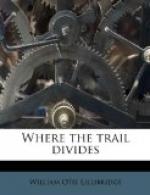This time he was gone longer; and when he returned it was with an armful of books—and something more. The fire was crackling merrily now, and volume by volume his load disappeared. Then for the first time he hesitated. There was still something to destroy, something which he had gathered in the old felt hat from off his own head; yet he hesitated. Greedy as a hungry animal deprived of its due the fire at his feet kept sending out spurts of flame like longing tentacles toward him; yet he delayed. Like the sulky thing it was, it had at last drawn back into passive waiting, when of a sudden, without a single glance, the man laid this last sacrifice, as he had done the first, gently down. But this time he did not watch the end. Swiftly, his bare black head glistening in the sunlight, he started away toward the now expectant broncho; and back of him the pathetic little gathering of useless trinkets, bearing indelibly the mark of a woman’s handiwork, a woman’s trust, mingled with the ashes of the things which had gone before.
Long ere the fire had burned itself out, the wicked-looking cayuse following a bridle’s length at his heels, he was back; waiting impatiently for the flame to die. No frontiersman, in a land where prairie fires spread as the breath of scandal, ever leaves fire alive when out of his sight; and to this instinct the Indian was true. Minute after minute he waited; until the flame vanished and in its stead there lay a mass of blazing coals. Then with a practical hand he banked the whole with a layer of earth until, look where one would, not a dot of red was visible. The act was the last, the culmination of preparation. At its end, with a single spoken command, the pony was alongside; his head high in the air, his tiny ears flattened back in anticipation. Well he knew what was in store, what was expected. No need was there of a second command nor the touch of a bridle rein. Almost ere the taking of the single leap that put the rider in his seat the little beast was away, his wide-spread nostrils breathing deep of the prairie air, the patter of his tiny hoofs a continuous song upon the close-cropped sod. As two human beings living side by side grow to know each other, so this dumb menial had grown to know his master. With a certainty attributed to the dog alone he had learned to recognise the mood of the hour. He did so now; and as time passed and the miles flowed monotonously beneath his galloping feet the relentless determination of the man himself was repeated in that undeviating pace.
Thus the journey southward was begun. Thus through the dragging hours of the September afternoon it continued. Many a time before the little beast had followed the trail from sun to sun. As well as the rider knew his own endurance he knew the possibilities of his mount, knew that now he would not fail. He did not attempt to quicken the pace, nor did he check it. He spoke no word. The earth was dry as tinder in the annual drouth of fall, and as time passed




